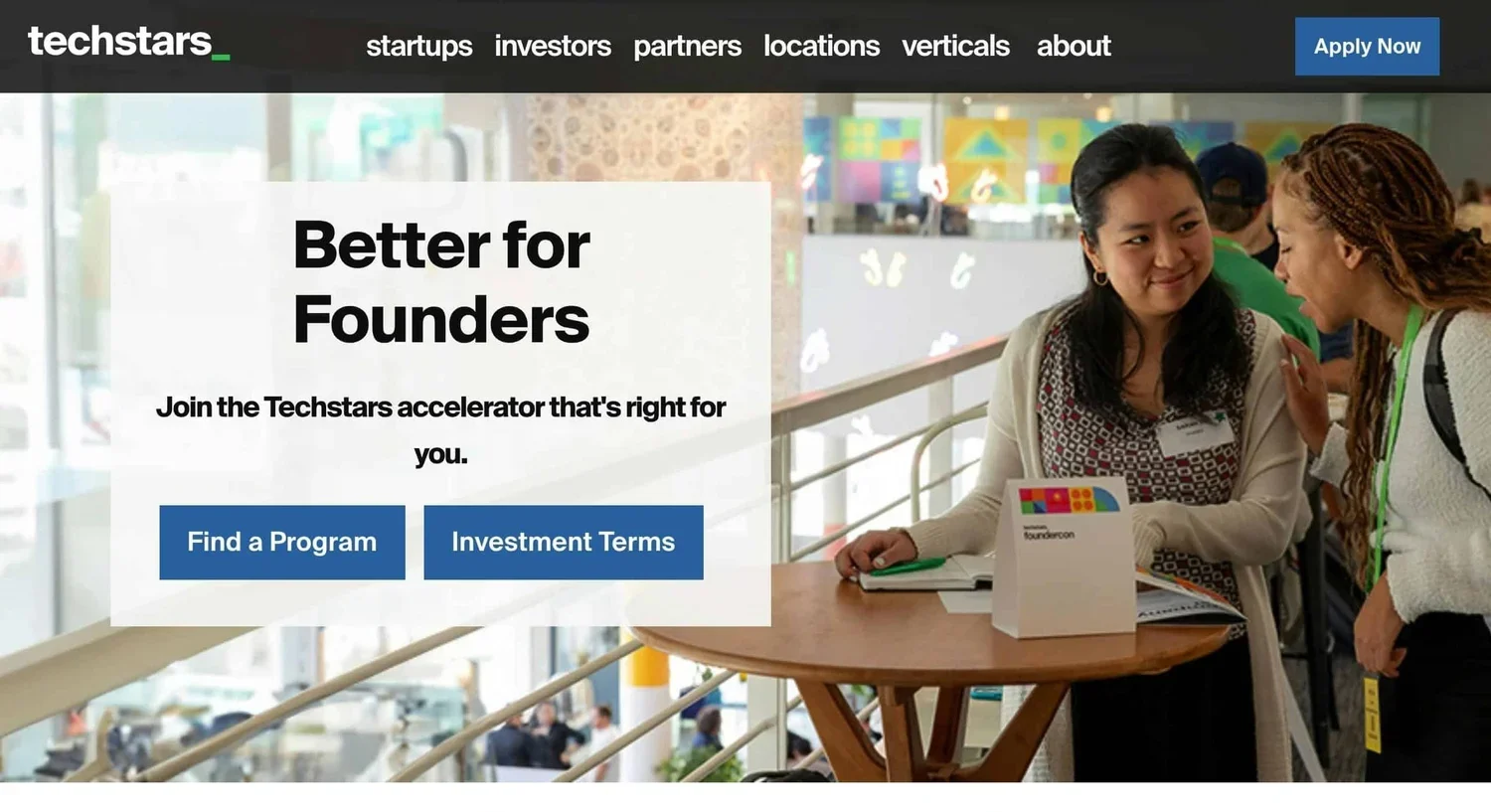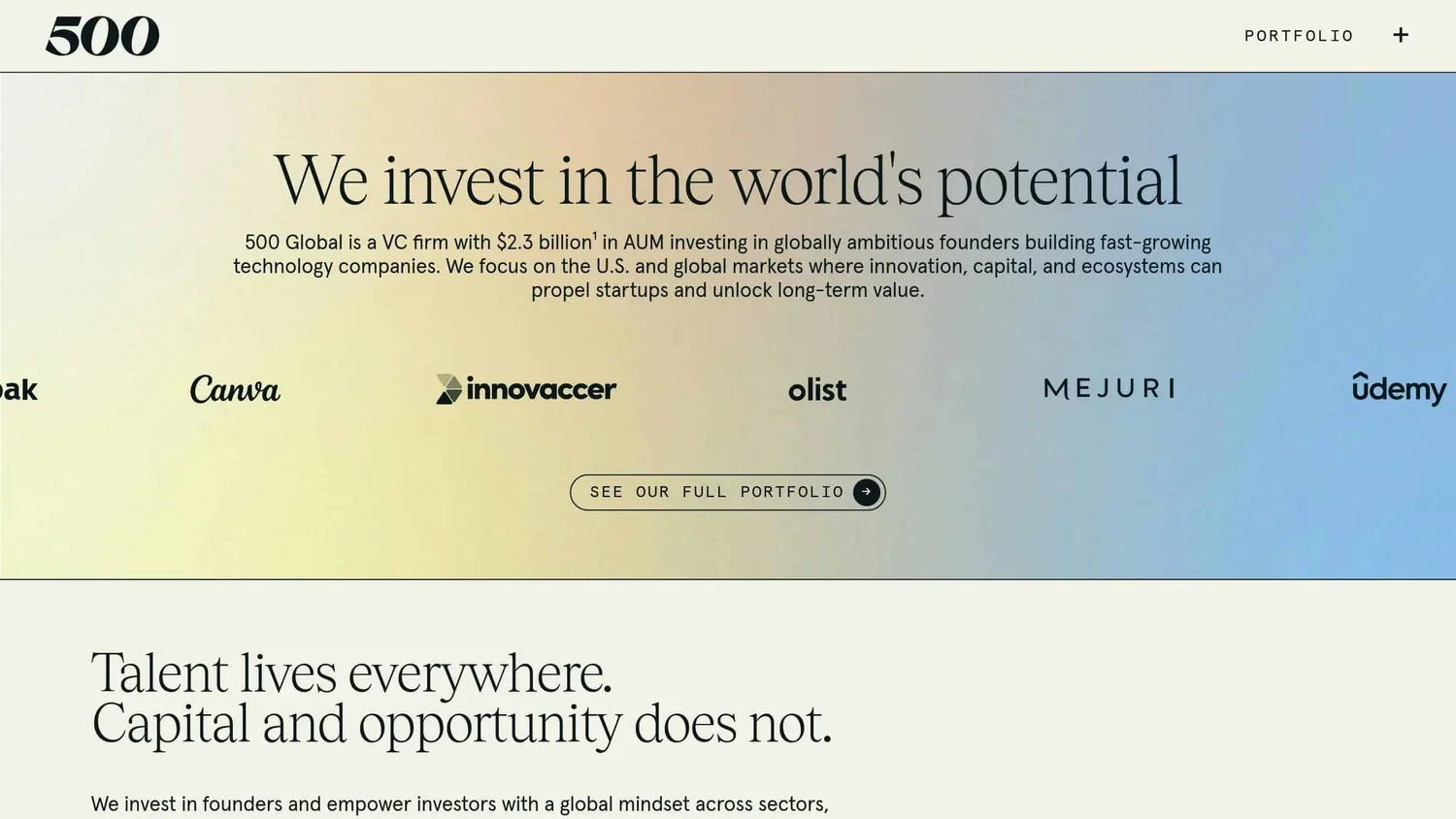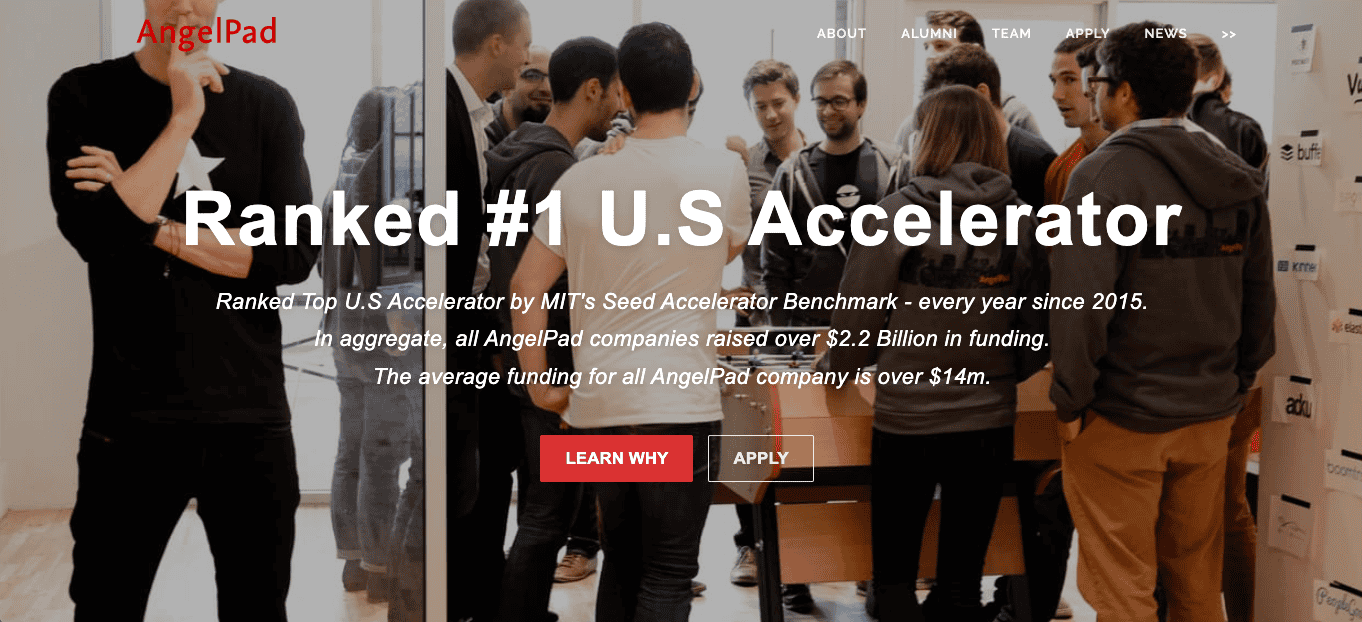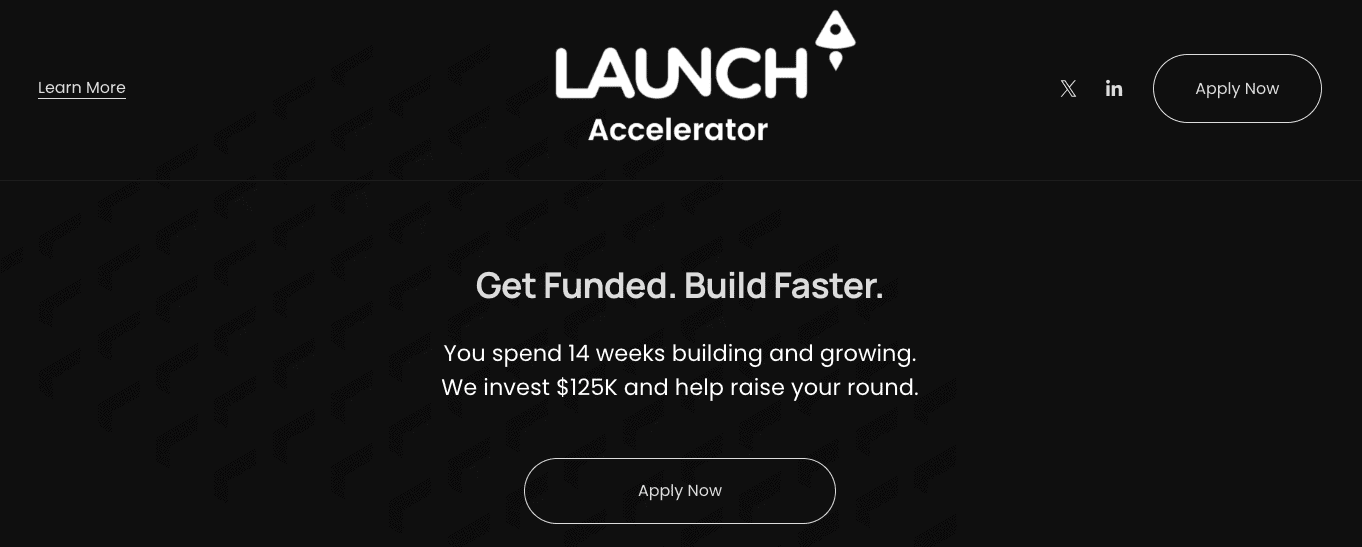Y Combinator Alternatives for YC Rejected Startups
Missed out on Y Combinator? No problem. There are plenty of other accelerator programs that can help your startup grow. While YC is highly selective (accepting only 1–2% of applicants), programs like Techstars, 500 Global, AngelPad, and LAUNCH Accelerator offer funding, mentorship, and networking opportunities to help startups succeed. These alternatives cater to different industries, funding needs, and growth stages, giving you multiple paths to scale your business.
Here’s a quick rundown of top alternatives:
Techstars: Provides $220,000 in funding and a global network of mentors and investors for startups across industries.
500 Global: Offers $150,000 for 6% equity, with a strong focus on international expansion.
Seedcamp: A European accelerator investing €100,000–€1 million, ideal for startups ready to scale.
AngelPad: Highly selective, focusing on B2B startups with $120,000 funding and hands-on guidance.
LAUNCH Accelerator: Invests $125,000 for 7% equity into 7 startups per cohort.
BONUS: Submit your application to Allied Venture Partners. Although we are not an accelerator program, we invest $100,000 to $350,000 into seed-stage tech startups based in Canada or the United States.
Each program has unique strengths, from quick funding processes to global connections. The key is to choose the one that aligns with your startup’s goals and stage of growth.
Top Startup Accelerator Programs Ranked: Ultimate Tier List for 2024 | Best Options for Founders
1. Techstars
For startups that didn’t make the cut at Y Combinator but are still eager for a fast-paced accelerator program, Techstars offers an appealing alternative. With over 50 programs worldwide, Techstars combines funding with hands-on mentorship in an intensive three-month format designed to sharpen business strategies and fuel growth.
Funding Terms
Techstars provides startups with $220,000 in funding, structured as follows: $200,000 through an uncapped MFN Safe and $20,000 via a Post-Money Convertible Equity Agreement (CEA). In exchange, startups give up 5% common stock and the future value of the $200,000 Safe [7].
"Our new offer gives founders more capital, better alignment, and a simpler and more easily comparable structure, enabling them to arrive at their next funding round with greater momentum." – David Cohen, Techstars Founder and CEO [7]
Here’s how it works: The $20,000 CEA translates to 5% common stock once the startup completes a priced round of at least $1 million. Meanwhile, the $200,000 Safe converts during the same funding round, using the lowest cap Safe terms issued between the start of the program and that round [7]. Additionally, startups may qualify for a $100,000 convertible note with a 20% discount rate and a cap ranging from $3 million to $5 million [8]. Importantly, there’s no fee to join the program.
Techstars doesn’t stop at funding - it also provides a robust support system to help startups succeed.
Mentorship & Network
One of Techstars’ standout features is its mentorship-driven approach. With access to a network of over 3,900 mentors worldwide, startups gain direct guidance from seasoned operators, investors, and alumni founders who’ve walked the path before [10][9].
"Mentorship is the secret sauce of Techstars. It's about having been there, done that, and guiding our startups to avoid the same pitfalls." – Brad Feld [12]
The mentorship doesn’t end when the program wraps up. Startups remain connected to Techstars’ global network, ensuring long-term support. This approach has delivered results: 74% of Techstars companies secure funding within three years, and alumni companies have collectively raised over $30 billion [11][7].
Jasmine Jones, Co-founder of Cherry Blossom Intimates, shared her success story:
"I met more than 90 mentors who helped me to refine my business model, build my cap table, and raise $1.25 million in 30 days. The network is invaluable." – Jasmine Jones, Co-founder, Cherry Blossom Intimates [13]
Program Structure
The three-month accelerator program is carefully structured to maximize outcomes for startups [11]. Early on, participants work closely with mentors to refine their strategies and identify any gaps [10]. The middle phase emphasizes networking and targeted support to strengthen both team dynamics and business models [10]. The program culminates in Demo Day, where startups showcase their progress to a select group of investors [12]. Historically, startups graduating from Techstars raise over $1 million in additional funding after completing the program [13].
Techstars also offers industry-specific programs tailored to sectors like fintech, healthcare, and mobility [10]. For startups in earlier stages, pre-accelerator programs provide a stepping stone to the full accelerator experience [11].
Application Process
With over 50 programs worldwide, Techstars runs several application cycles throughout the year, giving startups multiple chances to apply. The process involves submitting detailed information about the team, product, and market opportunity. Since 2021, demand for Techstars programs has tripled, making competition intense [7]. However, the variety of programs allows startups to find the best fit based on their industry and geographic focus.
Techstars welcomes both U.S.-based and international startups, making it a gateway for global companies looking to break into the U.S. market [7]. In the Asia-Pacific region, programs are tailored with a $100,000 uncapped MFN Safe to align with local market conditions [7].
2. 500 Global
For startups with their sights set on international growth, 500 Global stands out as an accelerator with a presence in 81 countries and a history of fostering global expansion.
Funding Terms
For founders who don’t secure a spot with YC, 500 Global provides another attractive option: $150,000 in funding for 6% equity [15]. However, there’s a $37,500 participation fee, which is deducted from the total funding amount, so founders receive a net amount of $112,500 [14]. This straightforward funding approach targets startups that are either gaining early traction or preparing to expand into international markets. The financial backing is just the beginning, paving the way for mentorship and global networking opportunities.
Mentorship & Network
500 Global boasts a vast network of over 5,000 founders and 400+ mentors, all part of its portfolio of 2,800 companies across 81 countries [16][17][18]. Mentors provide weekly talks, office hours, and one-on-one sessions, offering both broad insights and tailored advice.
"We have > 120 mentors across a number of domains, industries, companies, and even locations. Many of them are founders/CEOs of our own portfolio companies." – Christine Tsai, Founding Partner at 500 Startups [18]
This global network is especially appealing for startups with international goals. As one founder put it:
"Being in 500 startups gives you immediate access to one of the most powerful networks in tech... The 500 network is not all business but also an extended family of sorts based on mutual respect, camaraderie and a desire to change the world together." – George Favvas, 500 Startups W11 [18]
The program’s impact is clear: startups often double their Monthly Recurring Revenue (MRR) during the three-month accelerator [17].
Program Structure
500 Global’s four-month accelerator program, based in Palo Alto, is designed for startups aiming to grow quickly and enter global markets. Around 30–40% of participants are typically international startups [19].
The curriculum focuses on practical growth strategies, including customer acquisition and market distribution. Startups receive guidance on refining their go-to-market strategies while building connections with other founders. The program strikes a balance between structured learning and hands-on execution, helping participants prepare for global expansion from day one.
Application Process
500 Global’s rolling admissions process ensures startups can apply at any time through their online portal (flagship.aplica.500.co) [19]. The selection process includes several steps: submitting an online application, undergoing a thorough review, participating in interviews if shortlisted, and receiving a final decision [19].
When selecting startups, 500 Global evaluates:
Traction and Market Opportunity: Startups need real user metrics or solid market validation, not just theoretical ideas [19].
Global Potential: Companies should show how their product can scale across multiple regions, aligning with 500 Global’s international focus [19].
Team Strength: Founders’ backgrounds and complementary team skills are key factors [19].
Execution Speed: Startups that can solve problems and iterate quickly stand out [19].
Startups that aren’t accepted initially are encouraged to reapply after making meaningful progress [19]. This approach recognizes that growth takes time and that the right timing can make all the difference.
In line with its commitment to diversity, 500 Global actively seeks startups from various regions and industries, ensuring opportunities for founders who may not fit the typical Silicon Valley profile [19].
3. Seedcamp
Seedcamp combines a European perspective with a global reach, supporting startups that have established business models and are ready to scale.
Funding Terms
Seedcamp typically invests between $350,000 and $1 million in startups, with initial investments often starting at around €100,000 for a small equity stake. Depending on the specific needs of the business, funding can range from £200,000 to £700,000 [23][24][25].
Their approach involves offering slightly larger funding amounts compared to YC, ensuring alignment with institutional requirements. Seedcamp also reserves funds for follow-on investments, supporting companies through Series B rounds [20][22].
Mentorship & Network
One of Seedcamp's standout features is its Expert Collective (SxC), a network of mentors from industry leaders like Stripe, Cloudflare, and Uber [22]. Startups gain access to over 500 venture capitalists and angel investors, as well as a thriving community of more than 800 founders across nearly 300 companies [22].
Seedcamp-backed businesses have collectively raised over $7 billion in follow-on funding and created more than 5,000 jobs [22]. Many alumni have gone on to lead other companies within the Seedcamp ecosystem, further strengthening its network [22].
The value of this network is echoed by founders like Nicolas Julia, Co-Founder and CEO of Sorare, who shared:
"Seedcamp was the make it or break it type of partner. With Seedcamp's early backing, we were able to attract more great funds and business angels. If it were not for Seedcamp's very early support, when it was just myself and Adrien with a vision, Sorare would have not worked the way it did. We're very grateful to have found such a strong early-stage partner that helped us with their incredible network of people." [21]
Similarly, Nikolay Storonsky, Co-founder and CEO of Revolut, remarked:
"Seedcamp was an instrumental player in helping Revolut grow from a small-time startup into a global banking alternative. Hungry founders with ambitious plans should begin their journey with Seedcamp." [21]
Program Structure
Seedcamp's program is short but intense, lasting just a few weeks. It’s designed to prepare startups for their next funding round through tailored support, progress tracking, and opportunities to pitch directly to investors [24].
What sets Seedcamp apart is its community-driven approach. The program facilitates connections within the broader tech ecosystem, helping founders expand their networks and knowledge base. This support system extends long after the program ends [24]. Emmanuel Nataf, CEO and Co-founder of Reedsy, highlighted this aspect:
"Seedcamp offered great access to coaches and mentors, and that has been one of my favorite parts of the experience. People associated with Seedcamp seem genuinely happy to be involved, regardless of their business's level of success." [24]
Seedcamp accepts startups at various stages, from pre-product and pre-launch to post-revenue, making it accessible to a wide range of companies. This flexibility, combined with their focus on scaling proven business models, makes Seedcamp an attractive choice for founders aiming to grow sustainably - even for those who may have been turned away by other accelerators like YC [23].
4. AngelPad
AngelPad stands out for its highly selective process and a distinctive funding model. With an acceptance rate of less than 1%, it carefully chooses about 15 startups from a pool of nearly 4,000 applicants per cycle. This rigorous selection process is complemented by a funding structure designed to support the chosen teams.
Funding Terms
AngelPad offers a unique funding approach through a mixed-equity model. Each accepted startup receives $120,000, structured as follows: 5% in common stock and an additional $120,000 investment for approximately 2% equity - resulting in about 7% total equity stake [26]. On top of this, startups gain access to over $300,000 in cloud credits from AWS, Google, and Digital Ocean [26]. The program’s terms are straightforward, with no program fees attached.
But AngelPad’s support goes beyond just funding - it’s designed to help startups grow and succeed.
Program Structure
AngelPad runs on a 6-month cycle, welcoming new cohorts twice a year. The program focuses primarily on B2B startups and companies with strong growth or acquisition potential [28]. Unlike traditional classroom-style programs, AngelPad takes a hands-on approach. Founders collaborate directly with the AngelPad team to fine-tune their business models, enhance their products, and prepare for future funding rounds.
Application Process
AngelPad’s rigorous application process ensures only the most promising teams make the cut. A standout video pitch is critical, as it accounts for 90% of the application’s evaluation [27][28]. Applicants are assessed on key factors such as technical expertise, market growth potential, team dynamics, and early traction [27]. The process begins with an online application, followed by interviews with shortlisted teams. During these interviews, AngelPad evaluates market knowledge, decision-making abilities, growth potential, and product vision [27].
Certain types of businesses are less likely to be considered. AngelPad generally avoids startups in dating services, music-based ventures, biotech, hardware, or life sciences, as well as businesses not planning to operate in the U.S. [28]. Instead, they prioritize companies with strong technical foundations and clear paths to significant growth or acquisition.
As Thomas Korte, AngelPad’s co-founder, puts it:
"Building companies is very hard work." [28]
This belief drives their focus on founders who exhibit energy, determination, leadership, and deep industry expertise. Matt Solé, founder of ZealDocs (AngelPad #12), reflected on his experience:
"AngelPad embraces the risk of unproven founders and builds them into winners. Carine and Thomas coach us, guide us, push us, and we are forever better founders having experienced AngelPad." [29]
For startups that may have been overlooked by other accelerators, AngelPad offers a chance to grow under a program that prioritizes founder development while providing meaningful financial backing and valuable industry connections.
5. LAUNCH Accelerator
The LAUNCH Accelerator is a selective, high-impact, 14-week hybrid program for early-stage startups aiming to scale quickly, raise funding, and build strong investor and founder networks. Founders consistently highlight the program’s impact on fundraising, pitch development, and access to a powerful network of investors and peers.
Funding Terms
Startups accepted into the LAUNCH Accelerator receive $125,000 in exchange for 7% equity. There are no program fees, ensuring that the entire investment supports the company’s growth. In addition, LAUNCH retains the option to invest up to $250,000 (or pro rata) in the next two funding rounds, aiming for a long-term partnership and up to 10–15% ownership as the startup matures [30].
Program Structure
The program runs for 14 weeks in a hybrid format—primarily virtual, with select in-person sessions in San Francisco, Austin, and New York City. Each cohort is intentionally small, with just 7 startups, allowing for highly personalized mentorship and support. Founders participate in over 25 sessions and 10 demo days, gaining exposure to more than 300 investors. Key benefits include:
Fundraising support with pitch training and direct introductions to investors.
Access to a strong founder and investor community.
Opportunities to speak at high-profile events such as This Week in Startups and Founder University.
Long-term partnership with continued investment opportunities.
Application Process
The application process is straightforward and highly competitive. Founders apply online through the LAUNCH Accelerator website. Applications are reviewed on a rolling basis, with a focus on measurable traction, market size, and team strength. Shortlisted startups are invited for interviews, and those accepted receive immediate investment and access to the program’s resources.
Eligibility criteria include:
Pre-Series A stage with clear traction (e.g., $2K+ MRR with 20%+ monthly growth for enterprise/marketplace, or 3,000+ DAUs with 5%+ weekly growth for consumer products).
At least one full-time founder.
As LAUNCH Founder, Jason Calacanis, says:
“Our goal is to help founders raise faster, at higher valuations, and with more confidence. We invest in startups with real traction and the grit to build something lasting.” — Jason Calacanis, Founder of LAUNCH Accelerator
And the results speak for themselves:
“The pitch training and feedback were game-changers for us. We left the program with a clear story and a network of investors ready to support our next phase.” — Alumni Founder, LAUNCH Accelerator
“The community and mentorship at LAUNCH are unmatched. We felt supported every step of the way, from refining our product to closing our round.” — Alumni CEO, LAUNCH Accelerator
The LAUNCH Accelerator is designed for founders who are ready to scale, providing not just capital but the guidance and network needed to succeed in today’s competitive startup landscape.
BONUS: Allied Venture Partners
Allied VC stands as Western Canada's largest venture syndicate, supporting startups across Canada and the United States with early-stage funding. Unlike traditional venture capital funds that pool investments, Allied operates as an angel investor network, where high-net-worth individuals personally invest in promising startups.
Although we’re not an accelerator program, we have invested alongside some of the top accelerator programs worldwide, including Y Combinator, Techstars, 500 Global, LAUNCH Accelerator, and others. Even if you didn’t get into YC, we encourage all founders to submit their application and get on our radar for future funding.
"Started by entrepreneurs, driven by angels, and always free to pitch. We leverage a unique mix of entrepreneurial and investor acumen to support resilient founders aspiring to change the world." – Allied Ventures [2]
Funding Terms
Allied focuses on startups in the Seed and Series A stages that already have a product or revenue. Our typical investment ranges from $100,000 to $350,000, and we do not have any strict equity requirements.
Reviewing over 1,500 pitches annually, Allied invests in the top 0.5% [4]. What makes Allied different is our co-investment approach - we don’t lead funding rounds but join alongside other investors, allowing startups to tap into our extensive network while maintaining flexibility in their fundraising.
We invest in software and technology companies based and registered in North America, but do not invest in medtech, Biotech, Life Sciences, Climate Tech, or Cannabis. Additionally, we will happily invest on a SAFE note, convertible note, or preferred equity priced round.
Beyond funding, Allied provides mentorship and extensive networking opportunities across our network of angel investors, operators, and startup founders.
Mentorship & Network
The real strength of Allied lies in its extensive network of over 2,000 angel investors and venture capitalists. This group includes seasoned operators and investors from well-known companies. Founded by entrepreneurs, Allied offers more than just financial backing - it delivers strategic mentorship and guidance to help founders navigate challenges and scale their businesses.
Investment Structure
Allied takes a different approach from traditional venture capital funds by using an SPV syndicate structure. This method simplifies the cap table for startups while providing them access to multiple investors with diverse backgrounds and expertise.
Application Process
The application process at Allied is straightforward and entirely free. Founders start by submitting an online application through the online application form.
If the initial review sparks mutual interest, the process moves to an introductory call, followed by detailed due diligence and (sometimes) a 1-hour virtual pitch and Q&A session with syndicate members. After the pitch, investors confirm their commitments within 7–10 business days, and funds are wired within three days of closing.
This efficient process allows startups to secure funding in under four weeks, making it an attractive option for those looking for quick results - especially for YC-rejected startups aiming to regain momentum. By eliminating many of the hurdles associated with traditional VC firms, Allied offers a faster and more accessible path to funding.
Advantages and Disadvantages
Every accelerator program comes with its own set of strengths and challenges, and founders need to weigh these carefully to find the right fit. By understanding the trade-offs, startups can pinpoint the program that best matches their stage, goals, and unique needs.
Beyond these measurable factors, there are qualitative aspects that set each program apart. For example, funding structures vary widely. Some programs, like Techstars, offer larger investment packages but may require more equity or involve complex terms like uncapped Safe agreements. Founders need to assess whether the funding and resources justify the equity trade-off.
Mentorship is another key differentiator. Programs like Techstars emphasize personalized, industry-specific guidance. Adam Wilson of Sphero highlighted this value:
"At critical moments throughout our history, somehow someone in the Techstars network pointed us in a direction that led us to where we are today." [15]
Geographic reach is also critical. While many accelerators operate globally, programs like 500 Global and LAUNCH leverage local expertise, which can make them particularly appealing to startups with international ambitions [1].
Equity dilution is a big consideration, especially for early-stage startups aiming to preserve ownership for future fundraising rounds. Founders need to decide if the network, mentorship, and resources provided by the accelerator outweigh the cost of giving up equity.
For startups that don’t make it into YC, these programs offer solid alternatives. The key is identifying the accelerator that aligns most closely with your growth strategy. For instance, a technical B2B company might thrive in a hands-on, focused program like AngelPad, whereas startups looking for rapid funding or global reach might lean toward Techstars or 500 Global. Ultimately, the right choice depends on the unique needs and strengths of the startup.
Lets Recap
Getting turned down by Y Combinator might feel like a roadblock, but it’s far from the end of the journey. The startup world is filled with other accelerators that have paved the way for countless success stories. Take AngelPad and Techstars, for example. AngelPad boasts a high exit rate, while Techstars’ vast network has helped launch over 1,000 thriving companies [32]. These numbers make one thing clear: a YC rejection is just a redirection toward other impactful opportunities.
Every accelerator comes with its own perks - whether it’s speed, mentorship, or global connections. Instead of dwelling on rejection, use it to refine your vision and strategy. Abdelrahman Omran, a founder who didn’t make it into YC, shared this perspective:
"This isn't a setback; it's a setup for my next leap. I'm more committed than ever to innovating and creating solutions that address real-world problems." [33]
In the early days of building a startup, speed often outweighs perfection. Don’t let rejection slow you down. Let it fuel you to act faster, launch sooner, and learn directly from your users. As Jonah H. Harris wisely said:
"Speed compounds learning faster than correctness." [34]
YC might not be the path you take, but it’s certainly not the only one.
FAQs
What should startups consider when selecting an accelerator program like Techstars, 500 Global, or LAUNCH?
When selecting an accelerator program, it's crucial to weigh several factors to ensure it aligns with your startup's needs. Start by looking at the program's focus - does it match your industry and business objectives? Equally important is the quality of mentorship offered, as well as the strength of the accelerator's network and the tools they provide to support your growth.
You'll also want to dig into the funding terms and understand the equity stake the program requires. Take a close look at their track record - have they consistently helped companies achieve success? Lastly, consider the location and whether the program operates in-person or remotely. This can influence how effectively you can build relationships and connections during your time in the program.
What mentorship and networking opportunities do different startup accelerators offer?
Mentorship and Networking in Startup Accelerators
When it comes to startup accelerators, the mentorship and networking opportunities can differ quite a bit depending on the program.
Techstars is known for its intense, mentorship-focused approach. Founders in their programs gain access to a vast network of investors, corporate partners, and industry experts. The experience includes one-on-one mentorship sessions, workshops, and guidance tailored to specific industries, offering founders the tools they need to navigate challenges and grow their businesses.
AngelPad and LAUNCH take a more personalized route by working with smaller groups of startups. This allows them to offer highly customized mentorship from seasoned founders and industry leaders. Their hands-on approach is particularly beneficial for seed-stage companies looking for close, individualized support.
Both Seedcamp and 500 Global also emphasize structured mentorship and networking. They connect early-stage startups with investors and advisors through curated events and offer workshops to help refine business strategies and scale operations. While their focus and methods may vary, the core goal remains the same: to provide startups with meaningful connections and practical guidance that can make a real difference in their journey.
What are the pros and cons of joining an accelerator program in terms of equity and long-term growth?
Joining an accelerator program can be a game-changer for early-stage startups. These programs often provide mentorship, funding, and access to a network of investors and peers that can help push a business forward. They also bring a level of credibility and resources that can help startups grow faster. However, there’s a trade-off - founders usually give up 5% to 10% equity in exchange, which means less ownership and potentially less control over key decisions.
Accelerators can unlock new opportunities and speed up growth, but they aren’t without challenges. The intense focus on achieving rapid progress can create high-pressure environments, sometimes leading to burnout or scaling too quickly. Founders need to carefully consider whether the short-term benefits, like funding and mentorship, outweigh the long-term costs, such as equity dilution and the heavy demands these programs place on their time and energy.






